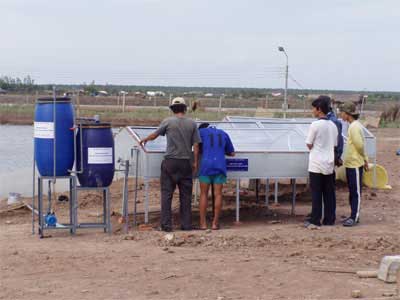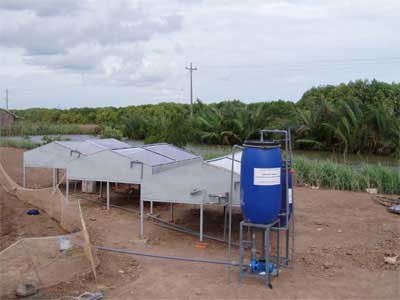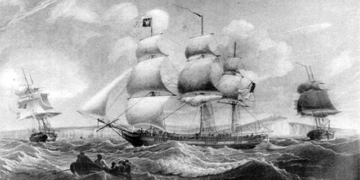Experts from the Institute of Chemistry (Vietnam Academy of Science and Technology) are implementing a new technology in practice: desalination of seawater using solar energy to obtain fresh water.
Two experimental systems have been installed in Ben Tre. One system is located in the Binh Dai fishing grounds, established at the end of August 2005, providing 120-150 liters of clean water daily for an eight-person workforce. The other, smaller system has been set up at a household in Ben Tre city.
 |
Experts are installing solar desalination systems at the Binh Dai fishing grounds in Ben Tre. Although drilling has reached depths of 400 meters, no fresh water has been found here. Installing a reverse osmosis filtration system would cost several hundred million VND, which is not suitable due to the dispersed population. |
The advantage of this technology is its low investment cost, ease of use, and the ability to provide clean water to residents in remote areas where fresh water is scarce, and there is no electricity.
This technology is based on the principle of evaporating seawater to collect fresh water.
Seawater is directed into storage tanks. The top of the tank is covered with a transparent glass roof to capture sunlight. The sun heats the salty water inside, causing it to evaporate. The vapor rises and condenses on the underside of the glass roof, forming droplets that flow into a collection container. The result is water that is cleaner than rainwater, as it is not contaminated by atmospheric dust.
However, the efficiency of this method is generally low, yielding only 2-3 liters per day per square meter because the sunlight is available for only 6-9 hours a day. Based on nearly a decade of research into thermal storage technology using phase change materials, the research team led by Dr. Nguyen Tien Tai from the Inorganic Materials Department has decided to apply this technology to enhance the efficiency of the seawater desalination process.
Dr. Tai revealed that the phase change material used by the team is a readily available and inexpensive compound in Vietnam, derived from petroleum products. In this context, phase change means that when the material absorbs heat, it becomes soft, and when it releases heat, it hardens.
 |
The installed system in Binh Dai consists of three modules, each with a solar collection area of 4 square meters. |
When placed in the desalination device, the material will store excess heat from sunlight during the day. When the sun sets, the material will release the stored heat to prolong the desalination process.
Through this method, the team has achieved a yield of 8-10 liters per day per square meter. The team is continuing to improve the technology to increase efficiency to 15-20 liters per square meter per day. They also plan to add some trace elements to the water after filtration, as distilled water produced in this manner is often too pure.
In March, the technology will be tested in Thua Thien-Hue.
Once perfected, the team will transfer the technology for mass production to localities such as islands and areas with fresh water scarcity.
The group’s hope is to reduce the cost to 1 million VND per square meter when applied on a large scale.
Minh Son




















































